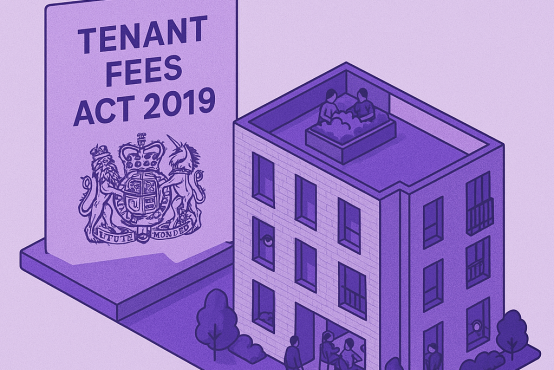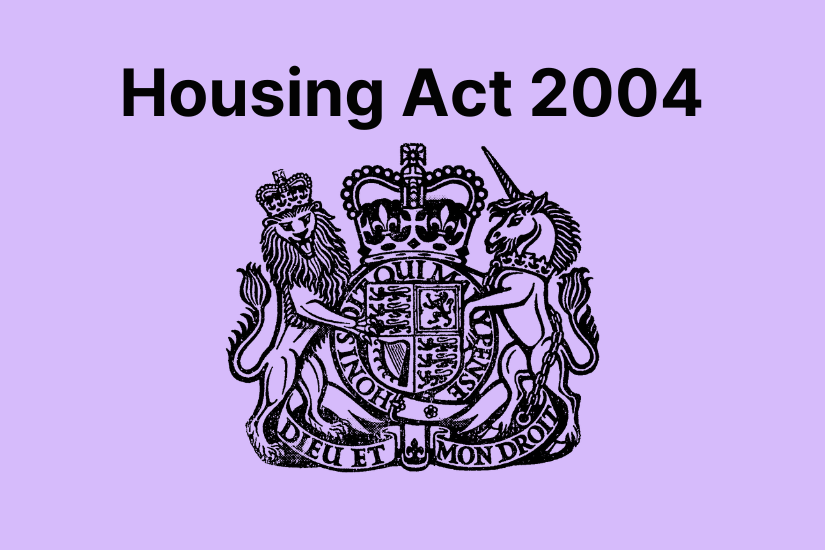The Tenant Fees Act 2019 marked a transformative moment in the private rental sector in England. For years, tenants had faced a growing list of fees at every stage of the rental process—application, referencing, tenancy renewal, and even end-of-tenancy cleaning.
The Act sought to put an end to these practices, reduce the upfront cost of renting, and improve transparency in landlord-tenant relationships.
The new law is not merely about banning fees. It’s about setting a standard for fairness and redefining the expectations tenants can have when entering into a tenancy agreement.
For landlords and letting agents, especially those managing Houses in Multiple Occupation (HMOs), the Act represents a significant shift in how services are delivered and charged for. With multiple tenants, shared spaces, and high turnover, HMO landlords must take extra care to ensure their practices are compliant and clearly documented.
This article breaks down the Tenant Fees Act 2019 in full: what it covers, how it is enforced, what is permitted, and what landlords must do to stay on the right side of the law. Whether you’re managing a single property or a growing HMO portfolio, this is legislation you need to understand thoroughly.
What Is the Tenant Fees Act 2019?
The Tenant Fees Act 2019 is a law that prohibits landlords and letting agents in England from charging tenants most of the fees that were previously standard practice. It applies to nearly all forms of private rented accommodation, including assured shorthold tenancies (ASTs), student lettings, and licences to occupy.
The legislation came into force on 1 June 2019 for new and renewed tenancies, and since 1 June 2020, it applies to all tenancies regardless of when they began. The Act was a response to widespread criticism that the rental market had become unaffordable for tenants due to excessive and opaque fees.
Its purpose is twofold: to improve fairness in the rental sector and to increase affordability for tenants. At the same time, it challenges letting agents and landlords to become more transparent, efficient, and tenant-friendly in how they deliver services.
For HMO landlords, this means re-evaluating all charges made to tenants across multiple rooms and tenancy types, ensuring that fees associated with cleaning, replacement keys, or changes in tenancy agreements comply with the restrictions.
Core Provisions and Impact
At the heart of the Tenant Fees Act is a simple principle: unless a fee is specifically listed as a permitted payment, it is banned. This means that landlords and agents can no longer charge tenants for referencing, admin, inventory, or other fees that were once routinely added on top of rent and deposits.
The list of permitted payments is clearly defined by the law. It includes rent, tenancy and holding deposits (within strict limits), charges for lost keys or late rent (if specified), and payments to change or end the tenancy early—but only under set conditions and within capped limits.
In HMOs, where multiple tenancy agreements may be in place and room changes are common, it is crucial that each permitted fee is justified and transparent. Prohibited charges spread across multiple tenants—such as a general cleaning fee or admin charge for room swaps—may result in compounded breaches.
What Are Permitted Payments?
Only a limited set of payments are allowed under the Tenant Fees Act. These are:
- Rent: Paid at regular intervals as agreed in the tenancy agreement.
- Tenancy deposit: Capped at five weeks’ rent (or six if annual rent exceeds £50,000).
- Holding deposit: Capped at one week’s rent, used to reserve a property.
- Default fees: Only for specific breaches, such as losing keys or late rent, and only if detailed in the agreement.
- Fees to change a tenancy: If requested by the tenant, capped at £50 or reasonable costs.
- Early termination fees: Only when initiated by the tenant and limited to the landlord’s actual loss.
- Council tax and utilities: If included as part of the tenancy arrangement.
In a typical HMO setting, communal utilities may be bundled with rent, so clarity in the tenancy agreement is essential. Ambiguity around utility charges—especially when split between rooms—can lead to disputes or accidental non-compliance.
Ban on Prohibited Fees
Before the Act, it was common for tenants to pay hundreds of pounds in fees before they even received the keys to a property. From referencing and credit checks to check-in fees, contract fees, and renewal charges, the system disproportionately placed financial pressure on tenants. The Act made this practice illegal.
Tenants can no longer be charged for:
- Application or referencing fees
- Inventory checks
- Contract negotiation or renewal fees
- End-of-tenancy cleaning (unless due to a breach)
- Admin charges or third-party services required by the landlord
HMO landlords often encounter higher turnover and may have considered charging fees for check-outs or professional cleaning. However, unless there is evidence that a tenant breached their tenancy terms, these charges cannot be deducted or passed on.
Holding Deposits: Conditions and Rules
The Act limits holding deposits to one week’s rent and imposes strict conditions on how they are handled. If a tenant proceeds with the tenancy, the deposit must either be returned or used as part of the first month’s rent or tenancy deposit.
In HMOs where rooms are let individually, multiple holding deposits may not be taken on the same room unless the previous applicant withdraws or fails vetting. This is especially important in shared accommodation where multiple tenants may be seeking rooms simultaneously.
Deposit Restrictions and Compliance
The Act introduced strict deposit caps to prevent landlords from overcharging or double-protecting funds. A maximum of five weeks’ rent can be taken as a tenancy deposit for properties with annual rent under £50,000. For higher-value tenancies, the cap increases to six weeks.
This applies even if tenants offer to pay more upfront. Any additional amount is considered a prohibited payment. Landlords must ensure deposits are protected using one of the government-approved schemes and serve the prescribed information within 30 days.
In HMOs, particularly where rooms are let individually on separate ASTs, landlords must be careful to cap each tenant’s deposit appropriately. Blanket deposits or pooled amounts across tenants in one house can quickly lead to breaches.
Default Fees and Fairness
Default fees must be clearly listed in the tenancy agreement and cannot be arbitrary. For instance, late rent fees can only be charged if rent is more than 14 days overdue, and the amount must be no more than 3% above the Bank of England base rate.
In a multi-tenant HMO setting, key replacements are a common issue. The Act permits charging for lost keys, but only the actual cost may be recovered. If a master key system is in place, this may mean higher costs—but evidence must be provided.
Cleaning charges are another area where HMO landlords must tread carefully. Unless there’s clear evidence of breach—such as significant damage or uncleaned areas beyond reasonable wear and tear—tenants cannot be charged for end-of-tenancy cleans.
Enforcement and Penalties
Enforcement of the Act is primarily the responsibility of Trading Standards and local councils. They have the authority to issue civil penalties, initiate prosecution, and apply to the First-tier Tribunal for repayment orders.
- First offence: Civil penalty of up to £5,000.
- Second offence within 5 years: Criminal offence with unlimited fines.
- Persistent breaches: May result in banning orders under the Housing and Planning Act 2016.
In shared properties with multiple tenants, enforcement can be triggered by just one tenant complaint. Given the number of tenancies in an HMO, landlords are more exposed to risk if they fail to follow the rules precisely.
Implications for Letting Agents and Landlords
For letting agents, the Tenant Fees Act has reshaped the business model. Agencies previously earning significant income from tenant fees must now offer more transparent, landlord-focused pricing. This has increased competition and led to consolidation in parts of the market.
Landlords, particularly those managing HMOs, face increased admin requirements. With multiple contracts to manage, separate deposits, and more key sets and agreements to track, compliance is more complex. However, it’s also more essential—errors in one tenancy agreement could be replicated across several, amplifying liability.
Updating tenancy agreements, training staff, and auditing internal processes are essential steps. Many landlords have chosen to partner with professional agents to help maintain compliance.
Practical Tips for Staying Compliant
- Audit existing tenancy agreements and remove any clauses that refer to banned fees.
- Use clear, itemised receipts when charging for permitted default fees.
- Document all holding deposit activity, including reasons for retention or refund.
- Review marketing material and websites to remove references to outdated charges.
- Educate tenants at the start of the tenancy about what they will and won’t be charged.
For HMO operators, consistency across rooms is vital. Ensure all tenants are treated equally and that fees are applied fairly and legally across the house. Any variation should be backed by documentation.
Conclusion
The Tenant Fees Act 2019 has rebalanced the rental sector in favour of tenants. It promotes transparency, prevents financial abuse, and compels landlords and letting agents to provide a higher standard of service. For property professionals, it’s no longer acceptable to rely on upfront tenant fees to drive profitability.
For HMO landlords, the implications are even more significant. With multiple tenants under one roof, compliance failures can escalate quickly. Clear agreements, lawful charges, and proper documentation are not just best practice—they’re essential.
The message is clear: fairer renting is here to stay. Embracing this change not only keeps you compliant—it strengthens your reputation and long-term success in the property sector.



